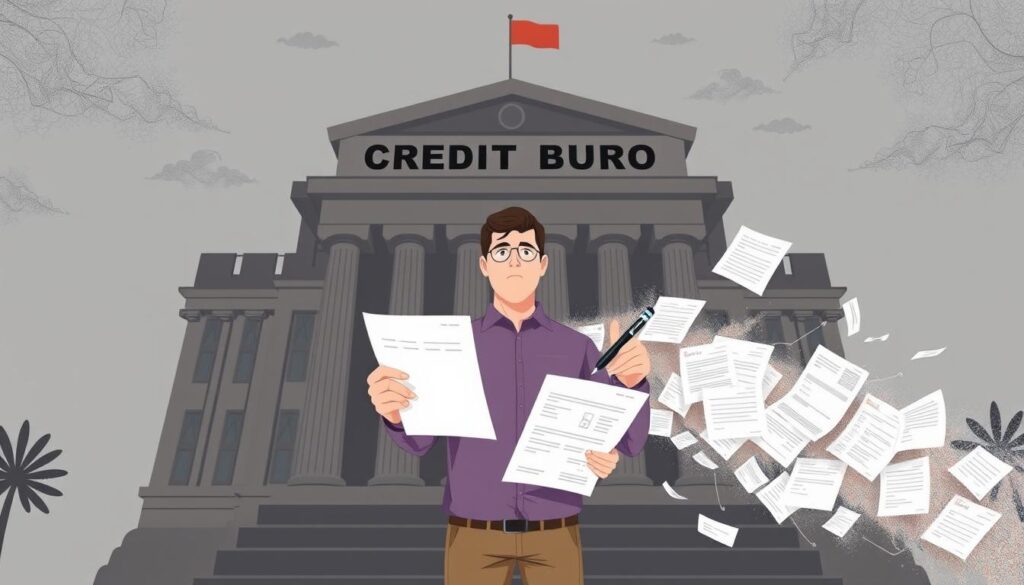Reporting evictions to credit bureaus is crucial for landlords and tenants. It impacts credit scores and affects future housing opportunities. This guide explains the process and its importance.
We’ll cover how to report evictions accurately to major credit bureaus. You’ll also learn about the rights and responsibilities of both parties involved.
Key Takeaways
- Understand the significance of reporting evictions to credit bureaus and their impact on credit scores.
- Learn the required documentation and steps to effectively report an eviction to the major credit bureaus.
- Discover strategies for disputing inaccurate eviction entries on credit reports.
- Explore options for building credit history after an eviction event.
- Gain insight into the landlord’s responsibilities in the eviction reporting process.
Understanding Tenant Eviction Credit Reporting
Evictions can severely impact a tenant’s credit report. Landlords often report these incidents to credit bureaus. This can make it harder for tenants to get housing, loans, or other financial products.
What is an Eviction Entry on a Credit Report?
An eviction entry shows a tenant was legally removed from a rental property. Landlords or property managers usually provide this information to credit bureaus. It can stay on a credit report for up to seven years.
Why Reporting Evictions to Credit Bureaus Matters
When landlords report eviction records on credit report, it affects a tenant’s creditworthiness. An eviction filing can lower a person’s credit score significantly. This makes it harder to get housing or loans in the future.
The credit impact of evictions can have long-lasting effects. It’s crucial for tenants to address any eviction issues on their credit report quickly. The eviction filing credit implications can be severe and long-lasting.
“An eviction entry on a credit report can be a major red flag for lenders, landlords, and other financial institutions, potentially making it more challenging for the affected individual to secure future housing, loans, or other financial products.”
how to report an eviction to credit bureau
Reporting an eviction to credit bureaus is crucial for tenants. It ensures accurate reflection on your credit report. This process maintains your credit history’s integrity and impacts future financial decisions.
Here are the key steps to report an eviction to credit bureaus:
- Gather Necessary Documentation: Collect court documents, eviction notices, and other official paperwork. These are essential when contacting credit bureaus.
- Contact the Credit Bureaus: Inform Equifax, Experian, and TransUnion about the eviction. You can submit this information online, by mail, or phone.
- Provide Detailed Information: Share specifics like eviction date, landlord’s name, and reason. This helps bureaus update your credit report accurately.
- Follow Up and Verify: Check if the bureaus recorded the details correctly. Review your credit report regularly to confirm accurate eviction reflection.
Notifying credit bureaus about an eviction maintains transparency in your credit profile. This proactive approach is crucial for navigating post-eviction challenges.
It can help position you better for future financial opportunities. Take control of your credit history today.

| Credit Bureau | Contact Information |
|---|---|
| Equifax | Phone: 1-888-766-0008 Online: www.equifax.com |
| Experian | Phone: 1-888-397-3742 Online: www.experian.com |
| TransUnion | Phone: 1-800-916-8800 Online: www.transunion.com |
Steps to Notify Credit Bureaus of an Eviction
Tenants facing eviction must act fast to report it to major credit bureaus. This can help lessen the hit to their credit score. Here are some steps to notify credit bureaus and reduce long-term effects.
Gathering Required Documentation
First, collect all necessary papers. This includes the court-issued eviction order or judgment. Also, get proof of the eviction date from your landlord or sheriff’s office.
Gather any other papers related to the eviction process. Having these docs ready will make reporting to credit bureaus smoother.
- A copy of the court-issued eviction order or judgment
- Proof of the eviction date, such as a notice from the landlord or sheriff’s office
- Any other relevant paperwork related to the eviction proceedings
Contacting the Major Credit Bureaus
Next, reach out to Experian, Equifax, and TransUnion to report the eviction. You can do this in two ways:
- Submitting a written dispute letter, along with the supporting documentation, to each bureau’s mailing address
- Initiating a dispute online through the bureaus’ respective dispute portals
Give detailed info about the eviction, including date and reason. This ensures accurate reporting rental evictions on your credit report.
Taking these steps helps tenants control the notify credit bureaus of eviction process. It can minimize long-term impact on their credit profile. Quick, accurate reporting is key to maintaining good financial health.
Eviction Records and Credit Impact
Evictions can severely damage your credit score. They make it harder to find housing, get loans, or use financial services. An eviction on your credit report can hurt your creditworthiness for years.
Landlords often report evictions to credit bureaus. This happens even if the tenant wins the case. The eviction record can stay on your credit report for seven years.
Lenders may see you as a high-risk borrower due to an eviction. This can lead to loan rejections or higher interest rates. It’s crucial to address eviction issues quickly and effectively.
| Potential Impact of an Eviction on Credit | Severity |
|---|---|
| Difficulty securing future housing | High |
| Challenges obtaining loans or credit cards | High |
| Increased interest rates on financial products | Moderate |
| Difficulties finding employment | Moderate |
The credit impact of evictions can be severe and long-lasting. It affects many aspects of your financial life. Understanding these consequences is key to protecting your credit health.

“An eviction on your credit report can haunt you for years, making it harder to find a new place to live or even get approved for a credit card.”
Disputing Inaccurate Eviction Entries
Inaccurate eviction records on your credit report can harm your financial future. They can limit your housing and loan options. Taking action to dispute these errors is crucial.
Checking for Errors on Credit Reports
Start by reviewing your credit reports from Experian, Equifax, and TransUnion. Look for any eviction listings and check their accuracy. Pay attention to details like property address, eviction date, and outcome.
Filing a Formal Dispute
Found an inaccurate eviction entry? File a formal dispute with the responsible credit bureau(s). Write a letter explaining the error and include supporting documents.
Provide court records or evidence showing the eviction was resolved. The credit bureau must investigate and fix any erroneous eviction information.
By disputing inaccurate evictions, you can restore your credit history’s accuracy. This helps you regain control over your financial future.
| Action | Description |
|---|---|
| Review Credit Reports | Thoroughly examine your credit reports from all three major bureaus for any inaccurate eviction entries. |
| File Formal Dispute | Submit a written dispute with the credit bureau(s) responsible for the erroneous eviction information, along with supporting documentation. |
| Follow Up on Dispute | Monitor the progress of your dispute and ensure the credit bureau(s) investigate and correct the inaccurate entry in a timely manner. |
Guidance for Tenants Facing Eviction
Eviction can be stressful, but tenants can take steps to protect their credit and housing prospects. Knowing your rights and getting legal help are key.
Here’s what to do if you’re facing eviction:
- Know your rights – Learn local landlord-tenant laws to ensure your landlord follows proper eviction procedures.
- Communicate with your landlord – Try to negotiate a solution or payment plan to avoid credit reporting.
- Seek legal aid – Contact tenants’ rights groups or legal clinics for advice and possible court representation.
- Document everything – Keep records of all communication, notices, and court proceedings about the eviction.
- Act quickly – Respond promptly to eviction notices or court summons to protect your rights.
Taking action can reduce the long-term impact on your credit and housing options. Seek guidance and support during this tough time.
Being proactive and informed is your best defense against eviction. Don’t hesitate to ask for help.
“The best defense against an eviction is to be proactive and informed.”

Protecting Your Credit After an Eviction
An eviction can hurt your credit, but you can take steps to protect it. You can rebuild your creditworthiness by addressing the aftermath proactively. This will help lessen long-term effects and strengthen your financial future.
Building Credit History Post-Eviction
Establishing a positive credit history is crucial after an eviction. Here are some strategies to help you build credit history post-eviction:
- Apply for a secured credit card: This type of card requires a refundable security deposit, which becomes your credit limit. Use it responsibly by making timely payments to demonstrate your creditworthiness.
- Become an authorized user on someone else’s credit card: This can help you piggyback on their established credit history and improve your own credit profile.
- Apply for a credit-building loan: These loans are designed to help you build credit by making regular payments, which are reported to the credit bureaus.
- Monitor your credit report regularly: Closely review your credit report for any inaccuracies or errors related to the eviction, and dispute them promptly.
By building credit history post-eviction, you can gradually improve your credit score. This can help you regain the trust of lenders and landlords.
| Credit-Building Strategy | Potential Impact on Credit |
|---|---|
| Secured Credit Card | Helps establish positive payment history and credit utilization |
| Authorized User | Allows you to benefit from the primary cardholder’s credit history |
| Credit-Building Loan | Demonstrates your ability to make regular payments on time |
Rebuilding your credit takes time and patience. By taking proactive steps, you can protect your credit after an eviction.
Eviction Entry Removal from Credit Report
An eviction on your credit report can be troubling. But don’t worry! You can take steps to dispute wrong information. This may lead to removing the eviction from your report.
Understanding Credit Reporting Time Limits
Eviction records usually stay on credit reports for seven years. This starts from the eviction filing date. After seven years, the eviction should be removed automatically.
Time limits may vary by location and credit bureau. Keep an eye on your credit reports. Know your rights to take needed steps for disputing eviction on credit report.
Learn about eviction entry removal from credit within the right time frame. This knowledge can help you act promptly and effectively.
“Timely and accurate credit reporting is crucial for maintaining a healthy credit profile, especially after facing challenges like an eviction.”
Understanding these time limits is key. It helps you work towards removing the eviction entry. This can improve your overall financial health.
Landlord Responsibilities in Eviction Reporting
Landlords must report evictions accurately to major credit bureaus. This protects their interests and informs tenants of potential consequences. Proper reporting helps maintain the rental market’s integrity.
Timely eviction reporting significantly impacts a tenant’s credit score. Landlords need to follow set protocols and provide detailed documentation. They must also comply with relevant laws and regulations.
Failing to report evictions can lead to legal issues. It may also harm the landlord’s credibility in credit reporting. Responsible reporting creates a fairer credit system for all.
This practice encourages tenants to fulfill their rental agreements. It also helps safeguard property owners’ interests. Overall, proper eviction reporting benefits the entire rental market ecosystem.

